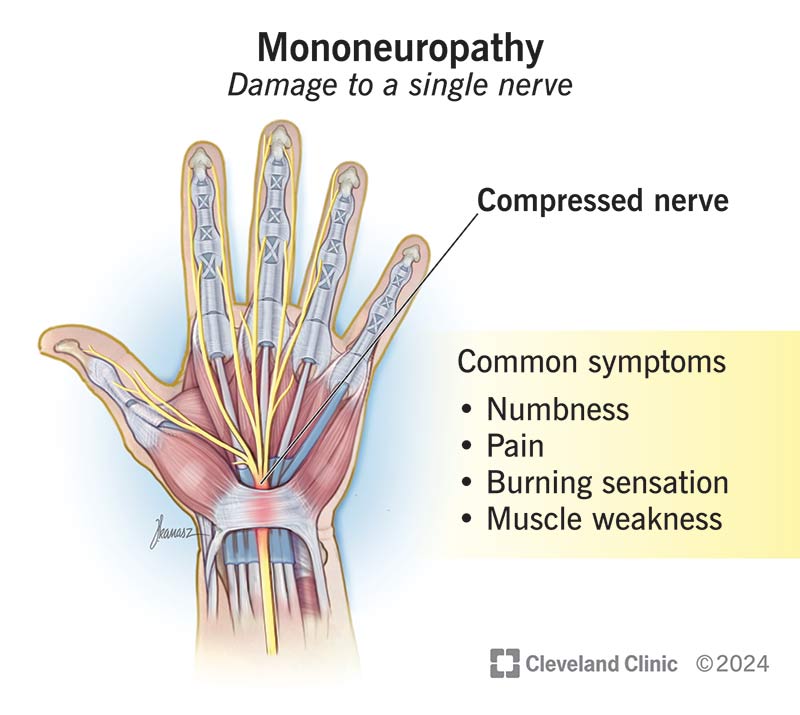Mononeuropathy is damage to a single peripheral nerve. It can cause symptoms like pain, numbness and muscle weakness. Treatment for mononeuropathy depends on several factors, like the nerve that’s affected, the underlying cause and the severity of damage.
Advertisement
Cleveland Clinic is a non-profit academic medical center. Advertising on our site helps support our mission. We do not endorse non-Cleveland Clinic products or services. Policy

Image content: This image is available to view online.
View image online (https://my.clevelandclinic.org/-/scassets/images/org/health/articles/mononeuropathy)
Mononeuropathy is damage to a single nerve that causes issues like pain, abnormal sensations (paresthesia) and/or movement issues. Mononeuropathy is a type of peripheral neuropathy — it happens to nerves in your body that are outside of your brain and spinal cord.
Advertisement
Cleveland Clinic is a non-profit academic medical center. Advertising on our site helps support our mission. We do not endorse non-Cleveland Clinic products or services. Policy
Persistent pressure on a nerve typically causes mononeuropathy, often due to an injury or inflammation. Damage can happen to the protective covering of the nerve (myelin sheath) or part of the nerve cell (the axon), slowing or preventing signals from traveling through it.
Technically, any individual nerve in your body can experience damage, leading to mononeuropathy. But it’s more likely to happen to nerves that run close to your skin or near a bone. Many of these types of mononeuropathy have their own name. Mononeuropathy can affect:
Another group of mononeuropathies is cranial mononeuropathies. They affect the 12 cranial nerves that come directly from your brain or brainstem. Bell’s palsy is one example. It affects the facial nerve (seventh cranial nerve) in your face.
Advertisement
You can also develop multiple mononeuropathies. This happens when you have damage to two or more nerves at the same time in different parts of your body.
Certain forms of mononeuropathy are common. For example:
Symptoms of mononeuropathy vary depending on the affected nerve. The most common symptoms are:
You should see a healthcare provider if you experience any of these symptoms.
Untreated mononeuropathy can lead to:
Several situations and conditions can cause mononeuropathy, including:
Direct injury to a nerve is the most common cause of mononeuropathy. This can happen through:
Any of the following conditions or situations can result in nerve compression (squeezing), leading to mononeuropathy:
Certain health conditions can cause mononeuropathy, though they’re more likely to affect several nerves at once, not just one. Examples of health conditions that can cause mononeuropathy include:
In most cases, healthcare providers can diagnose mononeuropathy by:
But because mononeuropathy has several possible causes, your provider may recommend additional testing if the cause isn’t obvious or if your symptoms are severe. Tests that can help confirm the diagnosis and/or find the underlying cause include:
Advertisement
Treatment for mononeuropathy depends on several factors, like:
Your healthcare provider will recommend treatments based on your unique situation. Some examples of treatment include:
It’s important to see a healthcare provider if you experience symptoms of mononeuropathy, like pain, numbness and/or muscle weakness. The sooner you can get treatment, the better the outcome.
If you have a mononeuropathy diagnosis and your symptoms get worse or change, talk to your provider.
It may be helpful to ask your provider the following questions:
The prognosis (outlook) for someone with mononeuropathy varies based on several factors, like the nerve that’s affected, the underlying cause and the severity of the nerve damage.
Advertisement
This condition can be painful and affect your ability to do everyday tasks. Some people experience long-lasting symptoms of mononeuropathy. But if your healthcare provider can find the cause of it and treatment is successful, mononeuropathy can be temporary.
Polyneuropathy happens when many nerves throughout your body malfunction at the same time. One example of acute (sudden) polyneuropathy is Guillain-Barré syndrome.
Mononeuropathy is damage to a single nerve in your body. Sometimes, it’s difficult for healthcare providers to distinguish multiple mononeuropathy from polyneuropathy.
You may know mononeuropathy by some of its other names, like carpal tunnel syndrome, Bell’s palsy and sciatica. It’s just a fancy name for damage to one nerve. It’s important to see a healthcare provider if you develop symptoms of this condition, like pain or numbness. The sooner you can get treatment, the better.
Advertisement

Sign up for our Health Essentials emails for expert guidance on nutrition, fitness, sleep, skin care and more.
Learn more about the Health Library and our editorial process.
Cleveland Clinic’s health articles are based on evidence-backed information and review by medical professionals to ensure accuracy, reliability and up-to-date clinical standards.
Cleveland Clinic’s health articles are based on evidence-backed information and review by medical professionals to ensure accuracy, reliability and up-to-date clinical standards.
Neuropathy, or nerve pain, can make daily life challenging. We can treat the causes of nerve pain and get you back to living life as pain-free as possible.
